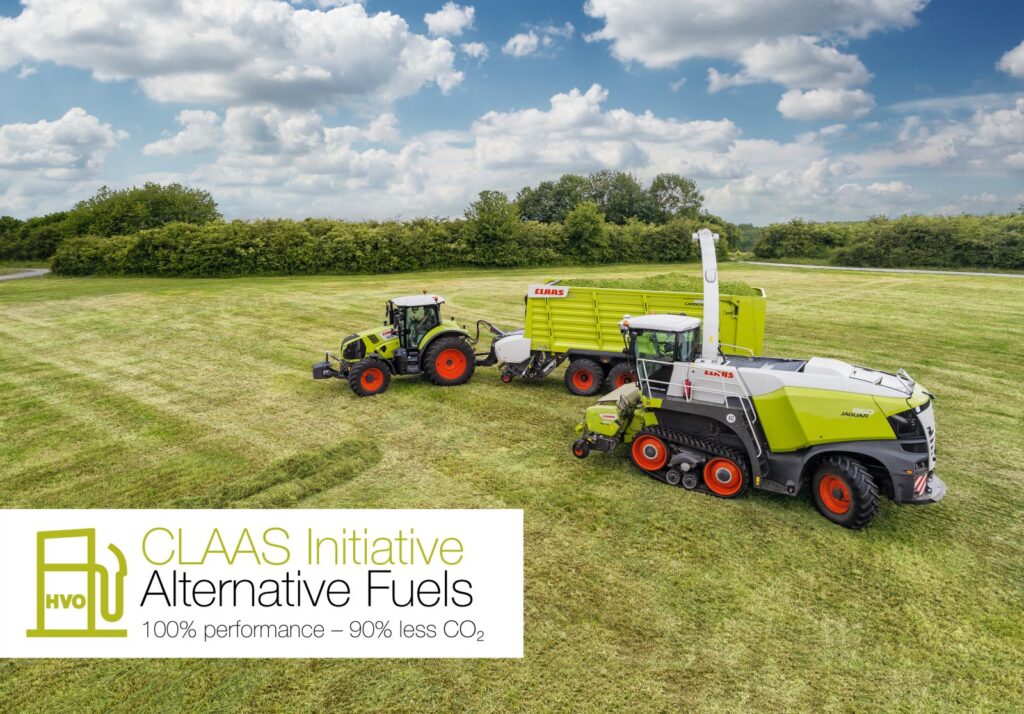Claas moves to sustainable HVO fuel in latest green initiative
2nd October 2023
Claas has announced that from 1st October 2023, all its agricultural machinery that meets the latest emissions standard will be approved for use with hydrotreated vegetable oils (HVOs) and new machines leaving the factory will now be filled with this sustainable biofuel, saving 2,500 tonnes of CO2 a year.

HVO consists mainly of used cooking oil and animal fats, along with vegetable oils, and has several advantages in that it does not require any engine upgrades, and can even be used in conjunction with conventional diesel fuel, without the need for special storage facilities.
Machine performance in terms of power, wear, durability or engine lifetime has been described as similar, with the added benefit of reducing CO2 emissions by up to 90% over the life cycle of the engine.
The switch to HVO fuel marks a significant step in the company’s efforts to protect the climate by increasing the sustainability of its machines. Dr Martin von Hoyningen-Huene, executive vice president at BU Tractor, commented:
“There are no real alternatives to the combustion engine for high-performance agricultural machines in the foreseeable future. So, we need solutions that reduce fossil fuel emissions associated with this type of drive, yet do not have significant adverse effects on manufacturing costs, consumption, weight and durability.
“Hydrotreated plant oils are an ideal choice because they already exist and their positive environmental impacts are immediately apparent.”
In the company’s view, a gradual de-fossilisation of agricultural production and machinery is needed to meet climate targets, and this will shape the development of future drive systems.
While battery-powered drive offers advantages for low engine outputs, this technology reaches its limits with increasing power and energy requirements. According to Claas, a battery-powered Jaguar forage harvester would have to be at least twice the size and weight of a current model using liquid fuel to achieve comparable performance and range.
In addition, gaseous fuels such as methane or hydrogen also have significant disadvantages in terms of their energy density and thus their energy storage requirements.
“In the future, battery-powered drives will offer a suitable alternative for municipal work, light fieldwork and applications in and around the farmyard,” explained Patrick Ahlbrand, from CLAAS Product Strategy.
“However, for harvesting machines and large tractors above 150 hp, there is no realistic alternative to sustainable liquid fuels in the long-term.”
Hassle-free use and wide availability
With HVO, there is no need to upgrade or replace Stage V machines, as they can simply be filled with the biofuel and then used exactly as before, even mixed with diesel, without any restrictions.
Existing farm fuel tanks previously storing diesel can also be used without requiring modification, enabling farmers and contractors to easily switch to the sustainable alternative.
Due to fuel characteristics comparable with those of fossil fuels, there are no noticeable losses in engine performance, operating lifetime, wear or durability. HVO can be used in its pure form (HVO100) or as a drop-in fuel mixed in any ratio with conventional diesel.
When using HVO100, CO2 emissions can be reduced by up to 90% over the entire life cycle of the engine, while less nitrogen oxide and particulate matter are emitted during combustion. Furthermore, since the fuel is manufactured mainly from waste and residues, no additional vegetable oils have to be produced, minimising competition with food.
During the production of HVO, biogenic raw materials are converted to hydrocarbons in a reaction with a small quantity of hydrogen (hydrogenation). This process modifies the characteristics of the vegetable oils to resemble fossil fuels, enabling them to be used as a diesel substitute in mobile work machines.
In many countries, HVO is already widely available at fuel stations, either in the form of pure HVO100 or blended with conventional diesel fuel. In contrast, in some countries HVO100 can only be sold through closed user groups such as company filling stations.
However, international efforts indicate that HVO100 will soon be available trans-nationally under the DIN EN 15940 fuel standard (paraffinic diesel fuel from synthesis or hydrotreatment).


